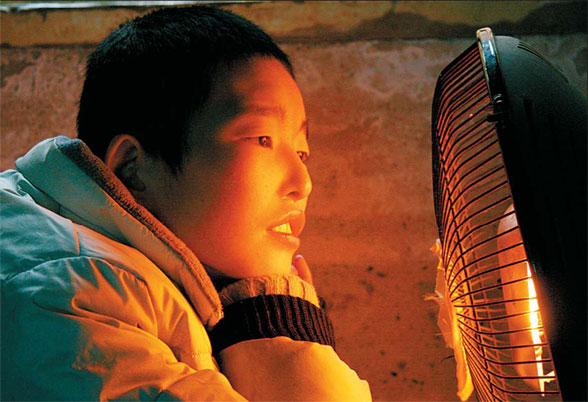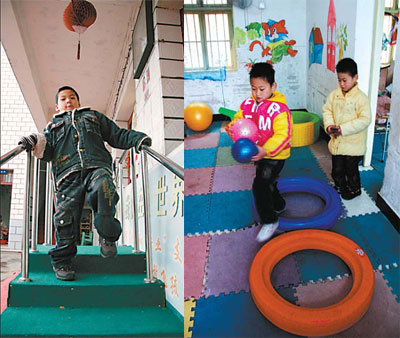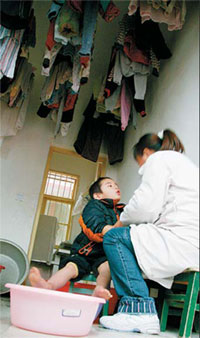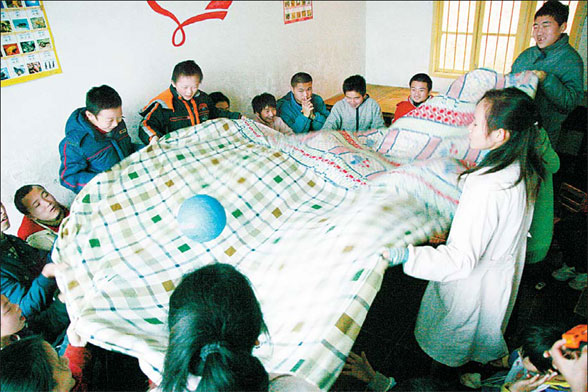Lighting up the darkness
|
Yang Weikang likes sitting in front of an electric heater to warm himself in the winter. |
Ten-year-old Yang Pei grabs a corner of a large bedcover and excitedly shakes it with several playmates. His eyes fix on a blue ball, which bounces and rolls into the boy's arms. He laughs and is awarded a toy by the teacher. Yang Jun, his twin brother, sits quietly on a chair and plays alone with a newspaper.
"They differ a lot in personality. Yang Pei, the older, is active and outgoing, while Yang Jun is gentle and introvert," says Zhang Yu, director of the Sunshine Center in Changsha, capital city of Central China's Hunan province. "They hardly play together but both have good friends. They are happy and do not look like they suffer from cerebral palsy (CP) at all."
|
Left: Ouyang Jun, 9, walks down stairs to develop his leg muscles. Right: The twins play games at the center. |
CP is a form of paralysis usually caused by brain damage occurring before or during birth. Those who suffer from CP are marked by a low IQ and muscular impairment. They often have poor coordination and speech and learning difficulties.
Founded in 2001, The Sunshine Center caters to CP and autistic children. It currently has 43 children, mostly under the age of 10, who are receiving rehabilitation therapy from 11 teachers.
The Yang twins' morning routine starts with limb massage and functional training. Later comes physical exercise. The boys walk up and down stairs with the help of teachers. This helps develop their leg muscles and avoids muscular atrophy. Since they don't know how to take care of themselves, they also practice basic skills, such as putting on and taking off clothes. They repeat these exercises in the afternoon classes.
"Children are easily bored by repetitive training. Then we take them to the playground, bring them toys and teach them to sing," Zhang says. "Sometimes they make a little progress. But after they go back home on weekends, they forget what they've learned and completely rely on their parents."
There is no cure for either CP or autism and the treatment is life-long. The Yang twins can pronounce a few characters and repeat simple words. They like drawing and helping teachers and other children when they can't complete their assignments.
|
A worker helps 5-year-old Bei Bei wash the feet at the center. |
When 17-year-old Yang Weikang came to the center more than a year ago, he was in a severe situation. His IQ was equal to that of a 2- or 3-year-old child. He wore no underwear or trousers or shoes. He was incontinent, couldn't feed himself and always crouched on the ground.
Now Yang can hold a spoon and feed himself, though nearly half of his food spill on the desk, his clothes and the ground. He can also take off his own trousers.
But Zhang says that because he did not start therapy until late in his teens, he will be unable to speak for the rest of his life.
Most children in the center come from middle- and low-income families. Many parents are laid-off workers and rural migrants. Though the children's progress has aroused their parents' hope, some families have to quit the treatment because they can't afford the 700 yuan ($97) monthly tuition.
"Some parents have considered having another child. But they can't afford raising two kids and they fear that the next child will also be unhealthy," Zhang says.
Since CP and autistic children cannot take care of themselves, they are kept indoors most of the time.
"We will take the children to the park on Children's Day every year. College students will visit the center on weekends and play with the children. What we are doing is to make these children feel happy," Zhang says.
|
Left: Teachers use different toys to help CP and autistic children exercise their muscles at the Sunshine Center. Right: Twins Yang Jun (left) and Yang Pei. |
|
A teacher leads the children in a game with a large bedcover. Photos by Fu Zhiyong |
(China Daily 02/19/2008 page18)



















